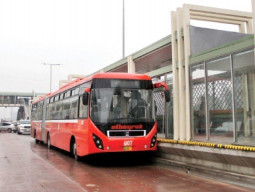Even if we disregard the fact that an overwhelming portion of these reserves originated as foreign debt, the fact remains that Sharif’s economic miracle is just one balance-of-payment crisis away from vanishing. Analysts have already warned about an upcoming balance-of-payment crisis: quarterly inflows from the IMF under the current loan programme will dry up by mid-2016, while loan repayments to the Paris Club and the IMF are due in 2016-17 and 2017-18, respectively. With declining exports and slow foreign direct investment, claims about an irreversible path of economic development constitute little more than empty rhetoric.
I distinctly remember when Pakistan’s foreign exchange reserves crossed the $10 billion mark for the first time in history, under the Musharraf-Aziz duo. They kept harping on about it for months on end. Unfortunately, their ‘economic turnaround’ on the back of record-high foreign exchange reserves failed to outlive their own government.
Grand plans to increase energy supplies alone will not avert a balance-of-payment crisis either. In fact, a bank CEO recently told me that he dreads the time when Pakistan will actually have a huge energy surplus. That surplus energy will be so cripplingly expensive that we won’t be able to export it. Excess energy may sound like a pipedream right now. But just imagine what we will do with excess megawatts (MW) of electricity if the government actually manages to reduce generation and transmission losses while adding the promised 10,400MW to the national grid by 2017-18.
For a developing country like Pakistan, the path to sustainable economic growth is always paved with exports. But if the State Bank of Pakistan (SBP) is to be believed, our exports “never really took off” since the 1970s because of inconsistent government policies. The decline in exports in the first five months of the current fiscal year alone has amounted to more than $1.4 billion or a 13.8 per cent decrease year on year.
In contrast with popular perception, the SBP believes Pakistan’s inability to export to its potential is ‘too chronic’ to be blamed on recent energy shortages alone. What the economy faces are structural barriers to exports growth — something the government should work urgently to remove, instead of making false claims about the irreversibility of economic development.
Published in The Express Tribune, January 1st, 2016.

1731570357-0/elon-musk-(1)1731570357-0-165x106.webp)
-(1)1717678110-0/Kendrick-(1)-(1)1717678110-0-165x106.webp)














COMMENTS
Comments are moderated and generally will be posted if they are on-topic and not abusive.
For more information, please see our Comments FAQ